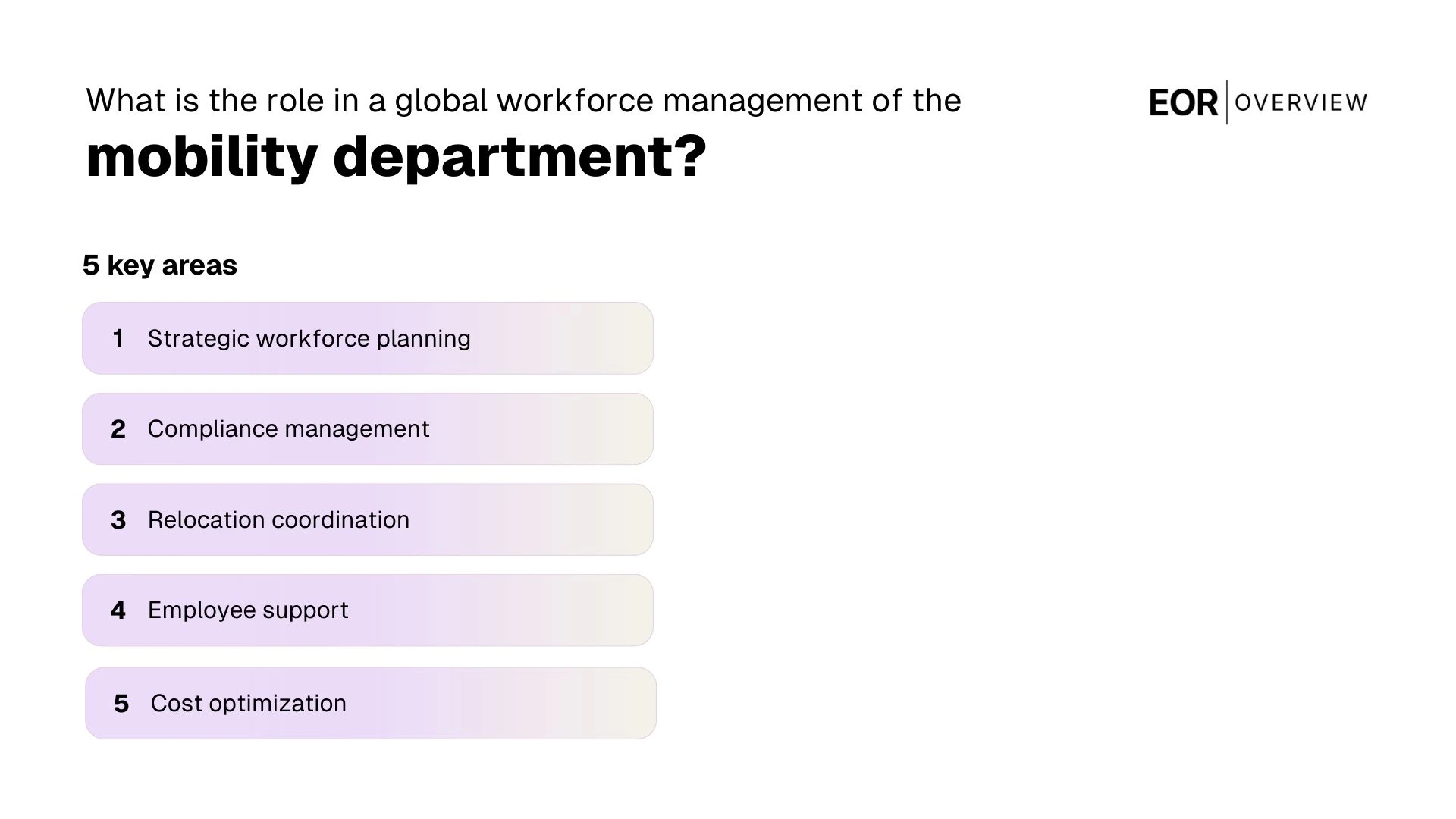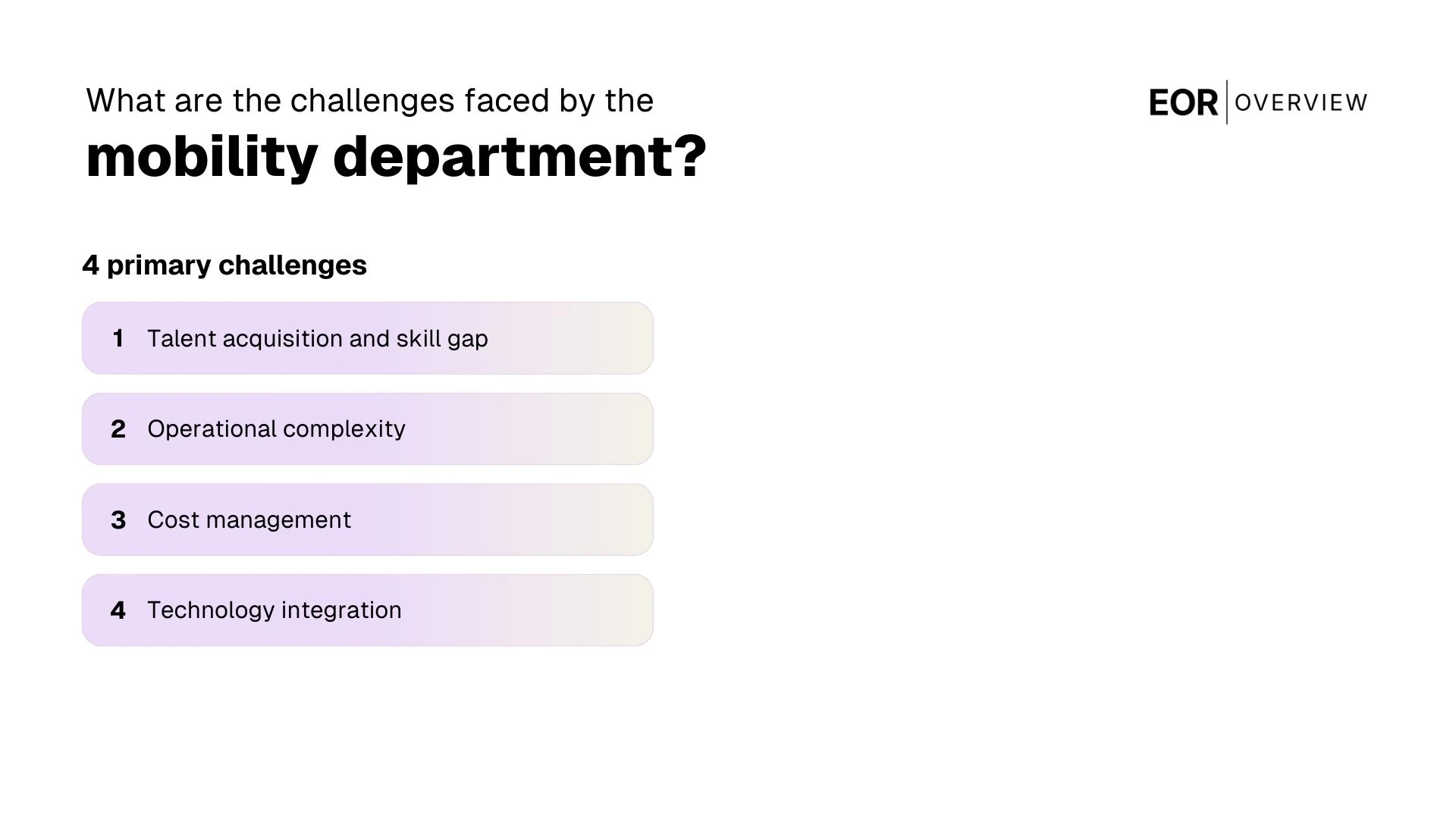A mobility department is a specialized organizational unit that manages the comprehensive process of employee relocations, international assignments, and global workforce transitions to ensure seamless talent movement across geographic boundaries.
For HR and hiring managers in tech, finance, and startup environments, establishing a robust mobility function has become essential for accessing global talent pools and maintaining competitive advantage. This strategic capability enables organizations to deploy their best talent where opportunities exist, support employee career growth through international experiences, and build truly distributed teams that transcend geographic limitations.
Companies with dedicated mobility departments report significantly higher success rates in international assignments and reduced relocation-related turnover, making this investment crucial for organizations scaling globally.
What is mobility department?
A mobility department is a specialized unit within an organization that manages the strategic movement of employees across different locations, whether domestically or internationally. This department within an organization serves as the central hub for coordinating employee mobility initiatives, from temporary international assignments to permanent relocation programs.
The mobility department works closely with the human resources department to develop comprehensive policies and procedures that govern how talent moves throughout the global workforce. Their management responsibilities extend beyond simple logistics to include compliance with international law, tax regulations, and immigration requirements that vary by location.
Modern mobility departments focus heavily on cost optimization while ensuring employee satisfaction during transitions. They analyze data to determine the most effective mobility strategies, negotiate vendor contracts for relocation services, and create standardized processes that support the organization's global mobility objectives. This strategic approach helps companies maintain competitive advantage by positioning the right employee in the right location at the optimal time.
Why is a mobility department important?
A mobility department serves as the strategic backbone for organizations managing global workforce movement. This specialized function is responsible for managing all aspects of employee mobility, from international assignments to domestic relocations, ensuring seamless transitions while maintaining compliance with local regulations.
The mobility department plays a crucial role in today's interconnected business environment where talent acquisition and retention depend heavily on flexible workforce strategies. Organizations implementing the mobility department structure gain significant competitive advantages through streamlined processes and reduced operational risks associated with global workforce mobility.
The primary functions include strategic planning, compliance management, cost optimization, and employee experience enhancement. These functions are listed in detail below
Strategic workforce planning: The department develops comprehensive strategies for talent deployment across multiple locations, ensuring the right skills reach the right markets at optimal times.
Compliance and regulation management: Teams implement robust systems to navigate complex immigration laws, tax requirements, and local employment regulations across different jurisdictions.
Cost optimization: The function establishes standardized processes and vendor relationships that significantly reduce expenses associated with employee relocations and international assignments.
Employee experience enhancement: The department creates seamless mobility experiences that improve retention rates and attract top talent seeking career advancement opportunities.
When you plan for implementing the mobility department, start with a pilot program focusing on your highest-volume mobility routes. This approach allows you to implement proven processes before scaling across all locations and contractor relationships.
How can you establish a mobility department?
Establishing a mobility department requires careful planning and strategic alignment with your organization's global expansion goals. The department ensures seamless coordination between talent acquisition and retention efforts while maintaining compliance with laws and regulations across different regions.
Start by defining the scope of your mobility department's responsibilities. The mobility department supports various functions including legal and tax compliance, global payroll management, and logistical coordination for employee relocations. This foundation helps determine the resources and expertise needed to deploy effective mobility solutions.
Next, identify key stakeholders who will collaborate with your mobility team. The department works closely with HR, finance, and legal teams to ensure comprehensive support for developing a global workforce strategy. Establishing clear communication channels between these departments creates a streamlined approach to international talent management.
Build your team with professionals who understand international employment regulations and cross-border logistics. Your mobility department should include specialists in immigration law, tax compliance, and relocation management. These experts help your organization comply with varying regional requirements while supporting both recruitment and retention objectives across different markets.

What is the role of the mobility department in a global workforce management?
The mobility department serves as the strategic backbone for organizations managing the movement of employees across different countries and regions. These specialized teams are responsible for managing the movement of talent to support global expansion initiatives while ensuring compliance with local employment laws and regulations in each market.
Mobility departments specialize in five key areas: strategic workforce planning, compliance management, relocation coordination, employee support, and cost optimization. These responsibilities are listed in detail below.
Strategic workforce planning: Coordinate with hiring managers to identify talent gaps and facilitate the deployment of employees to different countries based on business objectives.
Compliance management: Ensure adherence to local employment laws and regulations across different jurisdictions while managing visa requirements and work permits.
Relocation coordination: Oversee travel and relocation logistics, including housing, schooling, and cultural integration support for employees and their families.
Employee support: Provide professional and personal guidance throughout the mobility process to effectively manage the transition experience.
Cost optimization: Monitor and control mobility-related expenses while maintaining competitive packages that attract top talent in the global market.

What are the challenges faced by the mobility department?
Mobility departments face significant challenges in managing global workforce management initiatives while maintaining operational effectiveness. The complexity of coordinating personnel across multiple regions creates obstacles that require strategic planning and dedicated resources to overcome.
These challenges include talent acquisition difficulties, operational complexity, cost management issues, and technology integration problems. These challenges are detailed below to help hr professionals develop comprehensive solutions.
Talent acquisition and skill gap: Finding qualified candidates for new locations while addressing the skill gap between existing talent and international requirements increases recruitment costs and extends hiring timelines.
Operational complexity: Managing relocation logistics, benefits administration, and employee adjustment across different countries requires extensive coordination and strategic support.
Cost management: Balancing recruitment costs with budget constraints while considering outsourcing options versus developing internal capabilities for key functions.
Technology integration: Implementing systems that enable seamless integration of mobility processes while providing support to track goals and objectives across global operations.
Companies that fail to address mobility challenges early often experience 40% higher turnover rates among international assignments, significantly impacting employee experience and career development opportunities.
Remember that mobility programs require significant upfront investment and ongoing management commitment. Without proper planning and stakeholder buy-in, even the best mobility initiatives can become costly administrative burdens rather than strategic advantages.

